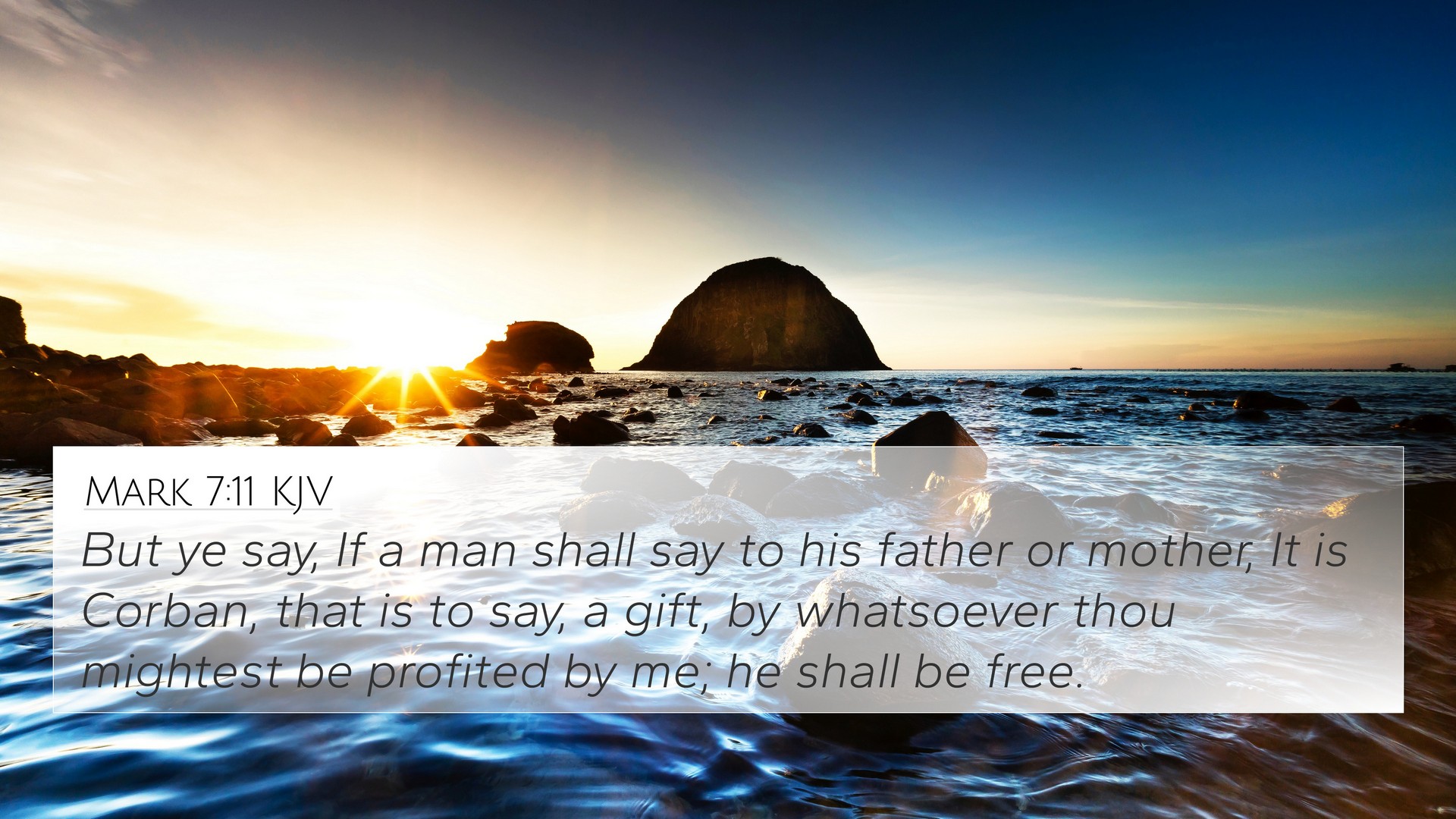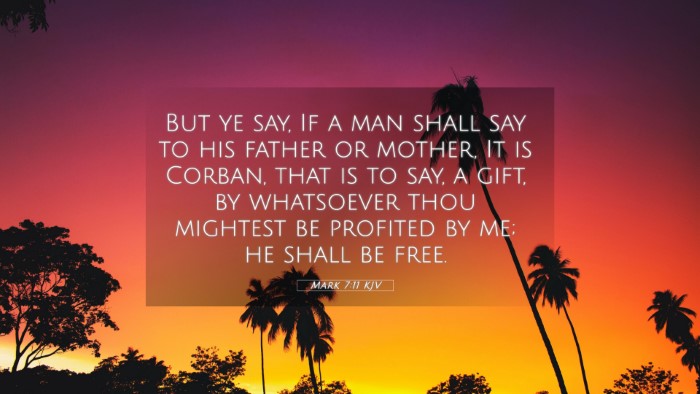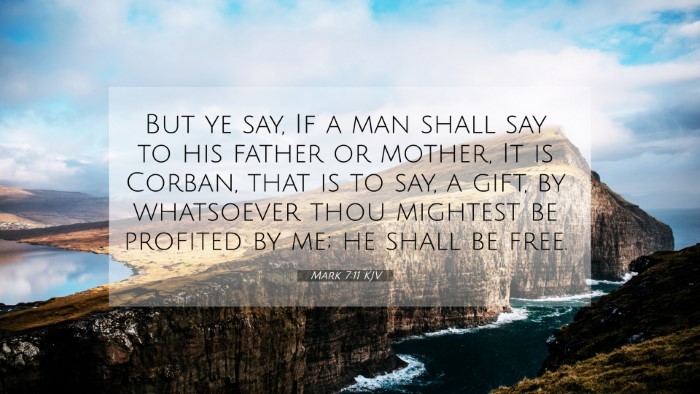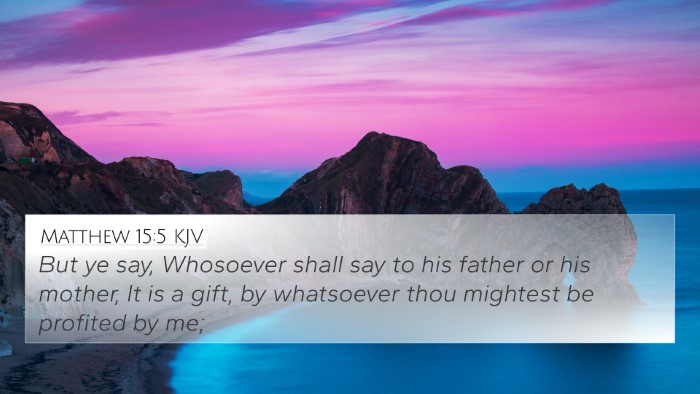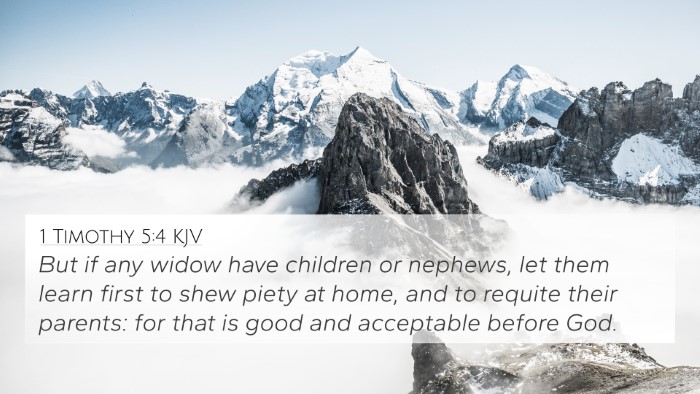Understanding Mark 7:11
Mark 7:11 states, "But you say, 'If a man says to his father or mother, "Whatever you would have gained from me is Corban" (that is, given to God), then you no longer permit him to do anything for his father or mother.'
Overview of the Verse
This verse addresses the conflict between human traditions and the commandments of God. Jesus highlights how the religious leaders were allowing human traditions to override the moral obligation to honor one's parents.
Key Themes in Mark 7:11
- Human Tradition vs. Divine Command: The verse illustrates the danger of placing tradition above God's laws.
- Corban Defined: The term 'Corban' refers to something dedicated to God, but here it is used as an excuse to neglect familial responsibilities.
- Obedience to Parents: The command to honor parents is rooted in the Ten Commandments (Exodus 20:12).
Commentary Insights
Matthew Henry: He emphasizes how traditions can sometimes camouflage genuine moral obligations. This was an abuse of the Corban vow, where the religious leaders allowed people to circumvent their covenant duties.
Albert Barnes: Barnes notes that the Pharisees had devised laws that effectively negated the Fifth Commandment, betraying their own teachings by allowing individuals to neglect their responsibilities.
Adam Clarke: Clarke explains that in using 'Corban' as an excuse, individuals were deceiving themselves into thinking they were fulfilling a vow to God while bypassing the fundamental duty of caring for their parents.
Bible Cross-References
Mark 7:11 connects with several significant passages in the Bible that explore similar themes:
- Exodus 20:12: "Honor your father and your mother, that your days may be long in the land that the LORD your God is giving you."
- Matthew 15:4: "For God commanded, 'Honor your father and your mother,' and 'Whoever reviles father or mother must surely die.'"
- Luke 18:20: "You know the commandments: 'Do not commit adultery, do not murder, do not steal, do not bear false witness, honor your father and mother.'"
- 1 Timothy 5:8: "But if anyone does not provide for his relatives, and especially for members of his household, he has denied the faith and is worse than an unbeliever."
- Titus 2:4-5: "Then they can urge the younger women to love their husbands and children, to be self-controlled and pure, to be busy at home, to be kind, and to be subject to their husbands, so that no one will malign the word of God."
- Proverbs 1:8: "Hear, my son, your father's instruction, and forsake not your mother's teaching."
- Isaiah 29:13: "And the Lord said: 'Because this people draw near with their mouth and honor me with their lips, while their hearts are far from me...'"
Thematic Connections
The interactions around Mark 7:11 invite a deeper exploration of how Scripture teaches about family obligations versus ritualistic religious practices. Here are thematic connections that enhance understanding:
- Respect for Parental Authority: The consistent biblical mandate to honor one's parents.
- Covenantal Responsibilities: The expectation to fulfill promises made, especially to family.
- God's Displeasure with False Religion: The condemnation of outward religious practices that lack sincerity.
Exploring Cross-Referencing Techniques
Understanding Mark 7:11 can be greatly enhanced through cross-referencing techniques:
- Tools for Bible Cross-Referencing: Utilize a comprehensive Bible concordance to identify connections between verses.
- Comparative Bible Verse Analysis: Study similar teachings across the Gospel accounts to discern thematic consistencies.
- Inter-Biblical Dialogue: Explore how this text informs and is informed by both the Old and New Testaments.
Bible Reference Resources
For further study, there are many resources available:
- Bible Cross-Reference Guide: A helpful resource to trace themes across different books of the Bible.
- Bible Chain References: Following a chain of related verses can deepen understanding of biblical themes.
- Bible Cross-Reference System: Learning how to effectively utilize these systems aids in Bible study.
Conclusion
Mark 7:11 raises essential questions concerning the priorities of faith and tradition. By understanding and drawing connections through biblical cross-references, believers can appreciate these teachings more profoundly and apply them to their lives today.
